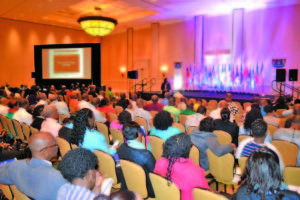Guyana is slated to be represented at a high-profile Anti-Money Laundering/Financial Crimes Conference in Florida, USA; which will, among other things, give countries a chance to review their AML efforts in their respective jurisdictions.
Attending on Guyana’s behalf is Attorney General Basil Williams, the current Chairman of the Caribbean Financial Action Task Force (CFATF).The conference is slated for April 18-20, 2018, in Miami, Florida, with Williams expected to present on Financial Technology (FinTech) effects on the changing role of the Compliance Officer.
According to the Legal Affairs Ministry on Tuesday, the compliance conference will be a two-day event that will provide participants with useful knowledge they can implement in their countries. “To this end, a group of high-profile regulators and compliance experts will discuss challenges faced by regulated businesses. Unlike any other, this conference will address the issues from a non-US point of view.”

“Beyond complying with the AML/CFT annual training requirements, this conference will provide participants a unique opportunity to personally engage with regulators and other experts. This personal contact will allow for a better understanding of the approach to enforcement in their respective jurisdictions,” a statement from the Ministry said.
The ComplianceAid Conference is an annual event that focuses on anti-money laundering, countering the financing of terrorism, and financial crimes prevention. It is the only conference that targets regulated entities of the Americas.
Over the past three years, the annual ComplianceAid Conference has been able to attract a gathering of directors and professionals from the AML space, across the region.
Only recently, a United States Department of State report was released that listed Guyana, among many other countries, as “major money laundering jurisdictions in 2017”.
The US International Narcotics Control Strategy Report (INCSR) Volume Two of March 2018 had declared that there was a lack of strong interagency cooperation among AML and drug-fighting agencies, adding that these departments did not have adequate human resources and the necessary training for complete effectiveness.
It had called for more training, education, and resources to improve the fight against money laundering. In its 2018 overview of Guyana, the INCSR posited that “narcotics trafficking and Government corruption are the primary sources of laundered funds”.
The report reiterated that Guyana was a transit country for South American cocaine destined for Europe, the Caribbean and North America, noting that traffickers were attracted to Guyana’s remote airstrips, porous land borders, and weak security infrastructure.
It was outlined that Guyana should continue to provide training to “increase awareness and understanding of AML laws within the Judiciary and agencies. The major agencies involved in anti-drug and money laundering efforts, such as the Guyana Police Force (GPF); the Guyana Revenue Authority (GRA); the Customs Anti-Narcotics Unit (CANU); the Special Organised Crimes Unit (SOCU) and the Financial Intelligence Unit (FIU) were observed as not being effective enough owing to “inadequate human resources, insufficient training, and a lack of strong interagency cooperation”.
Apart from Guyana, Brazil, Barbados, Cuba, The Dominican Republic, Haiti, Jamaica, Venezuela, Trinidad and Tobago, Peru, Canada, the United Kingdom and the United States itself were, among many others, listed as “Major Money Laundering Jurisdictions in 2017”.
Only last month former Attorney General (AG) Anil Nandlall accused his successor, Basil Williams, of conveying the impression that the country was compliant with the Anti-Money Laundering and Countering the Financing of Terrorism (AML/CFT) requirements, based on statements he had made in the National Assembly.



